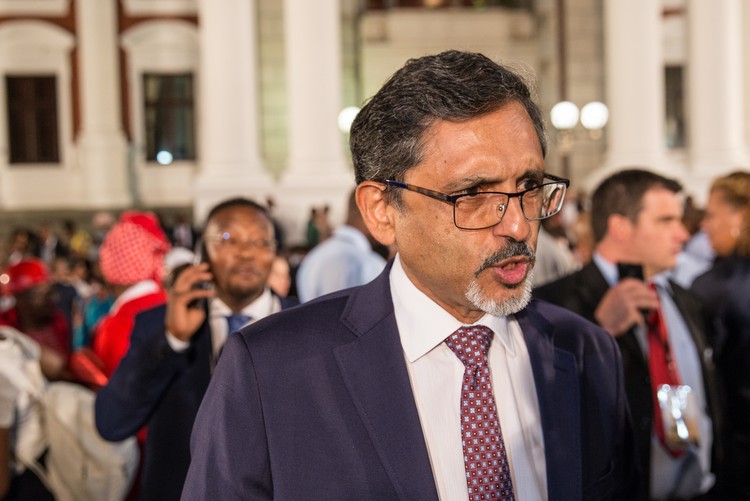
Department of Trade and Industry Minister Ebrahim Patel is responsible for ensuring that the National Lotteries Commission complies with the Public Finance Management Act. Archive photo: Ashraf Hendricks
15 August 2019
Over the last two weeks GroundUp has revealed evidence of dodgy dealings at the National Lotteries Commission (NLC) implicating senior management. To date there has been little response from government to allegations of mismanagement of funds by the NLC, despite it being a state owned entity.
On 13 May, GroundUp reported Department of Trade and Industry (DTI) spokesperson Sidwell Medupe saying: “The Minister has instructed the NLC Board and DTI Internal Audit to institute an investigation.”
A day later a press statement by the NLC claimed that an investigation is being conducted by the board into two funded projects. Its unclear what the status of this investigation is; we’ve received no answers to our questions about it.
When asked for information on whether the NLC intends to investigate allegations of conflicts of interest involving NLC COO Phillemon Letwaba, the NLC spokesperson Mr Ndivhuho Mafela responded via email:
“The NLC have discovered that both GroundUp and Raymond Joseph have been beneficiaries of grants. We are convinced that their attacks on the NLC and its COO are motivated by financial self interest. We are informed that these matters have been referred to the courts and therefore the NLC will no longer comment due to this potential conflict of interest.”
No court papers have been served on GroundUp or Raymond Joseph, who has reported most of our Lottery stories, so we do not know what is meant by the claim that the matter has been “referred to the courts”.
We also tried to reach Minister of Trade and Industry Ebrahim Patel’s office last week but did not receive a response. Instead, DTI spokesperson Sidwell Medupe said in a phone conversation that the NLC is independent and therefore any questions must be directed to it directly.
But the Department of Trade and Industry cannot wash its hands of the lottery scandal.
The NLC complies with the Public Finance Management Act (PFMA). This legislation gives the Minister of Trade and Industry executive authority over the NLC. The NLC itself states that Patel “exercises oversight in accordance with provisions of the PFMA”.
Section 49.2 (a) of the PFMA states that every public entity must have an accountable authority. In the case of the NLC, the board, of which Letwaba is part, is the accountable authority for the commission and is responsible for ensuring the NLC complies with PFMA.
According to section 50 of the Act, a member of the accounting authority cannot use their position for personal gain or to improperly benefit another person. A member of an accounting body must also disclose “any direct or indirect personal or private business interest that that member or any spouse, partner or close family member may have in any matter before the accounting authority”.
Earlier this month GroundUp reported that Phillemon Letwaba has multiple conflicts of interest involving family members and associates receiving lottery grants. For example, an October 2016 grant was allocated to a company of which Letwaba’s older brother was the sole director. Letwaba initially denied that his brother was involved in the company.
Letwaba’s continued appointment as a board member of the NLC goes against section 51 of the PFMA which states that the accounting authority (the NLC board) must implement a disciplinary hearing against any member of the public entity who “contravenes or fails to comply with a provision of this Act” and “makes or permits an irregular expenditure or a fruitless and wasteful expenditure”.
The NLC has refused to say whether a disciplinary hearing has been instituted against Letwaba or any other member of the NLC, as a public entity that complies with the PFMA. Considering the board has failed to do so, the task then falls to the executive authority, in this case Patel.
According to Section 63.2 of the PFMA: “The executive authority responsible for a public entity under the ownership control of the national or a provincial executive must exercise that executive’s ownership control powers to ensure that that public entity complies with this Act and the financial policies of that executive.”
Patel is therefore responsible for ensuring that the National Lotteries Commission complies with the Public Finance Management Act, which explicitly states that members of a public entity must be held accountable for any mismanagement of funds.
The National Lotteries Commission’s accusation that GroundUp and Raymond Joseph, the author of most of our NLC stories, have a conflict of interests when reporting NLC stories is false.
Neither Joseph nor GroundUp have received NLC funding.
The NLC gave money to The Big Issue, a non-profit magazine that homeless people sell to make a living, while Joseph was on the board. He wasn’t paid for his time on the board. In any case he resigned from the board in 2016.
GroundUp is owned by the non-profit organisation Community Media Trust (CMT). The NLC until a few years ago used to fund CMT’s HIV education work, entirely unrelated to GroundUp.
But even if the NLC did fund GroundUp or Joseph, this does not make it a conflict of interests for us to report shenanigans at the institution. On the contrary, if we discovered that one of our funders was being dishonest and chose not to report it, that would be a conflict of interest.
We have published stories over the past year that demonstrate probable violations of the Public Finance Management Act and the Lotteries Act by staff members of the NLC. There is very likely massive corruption taking place with Lottery money. It is time for the diversions, obfuscations and lies to stop. Minister of Trade and Industry Ebrahim Patel should fulfil his legal duty and intervene to stop the rot.